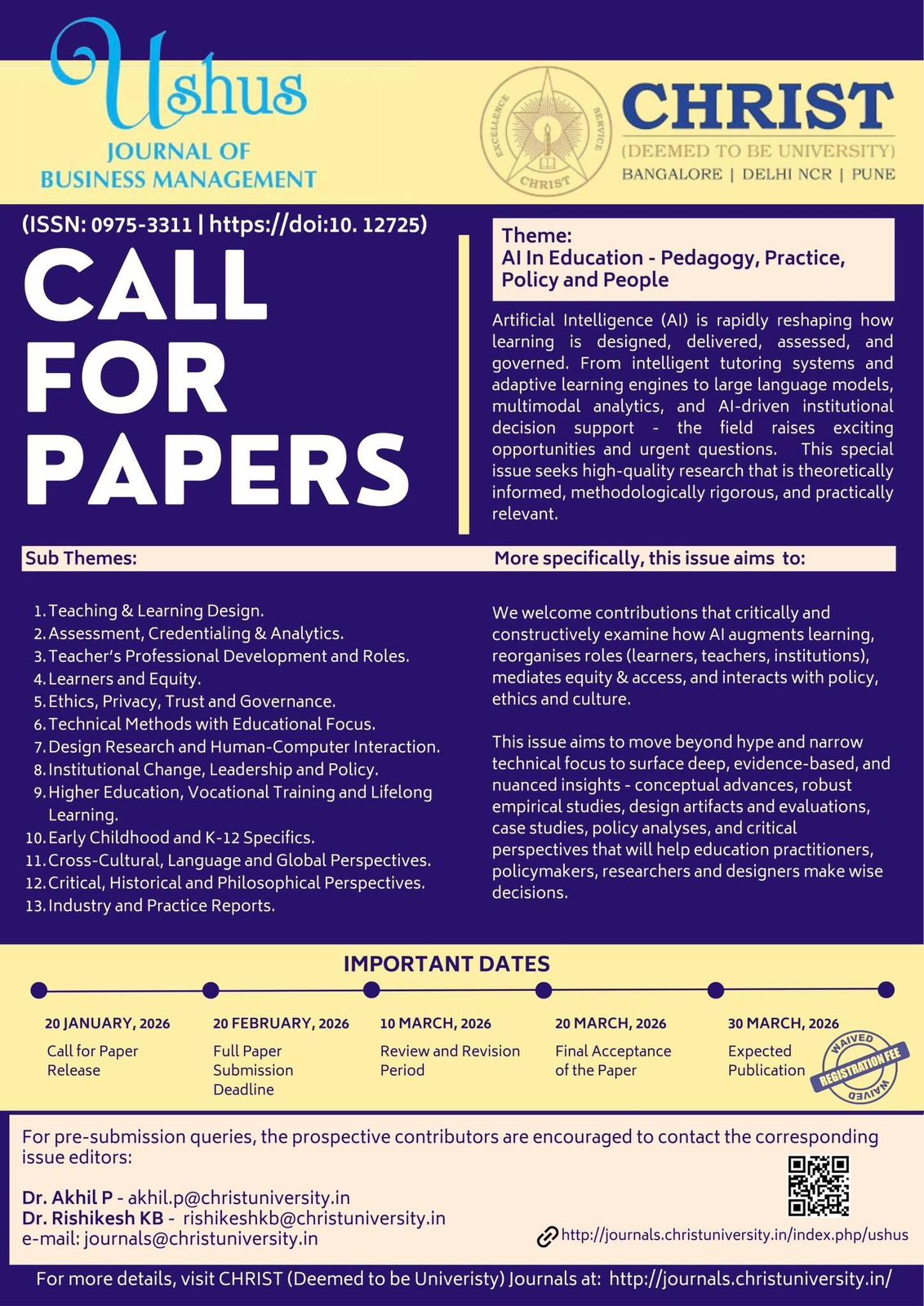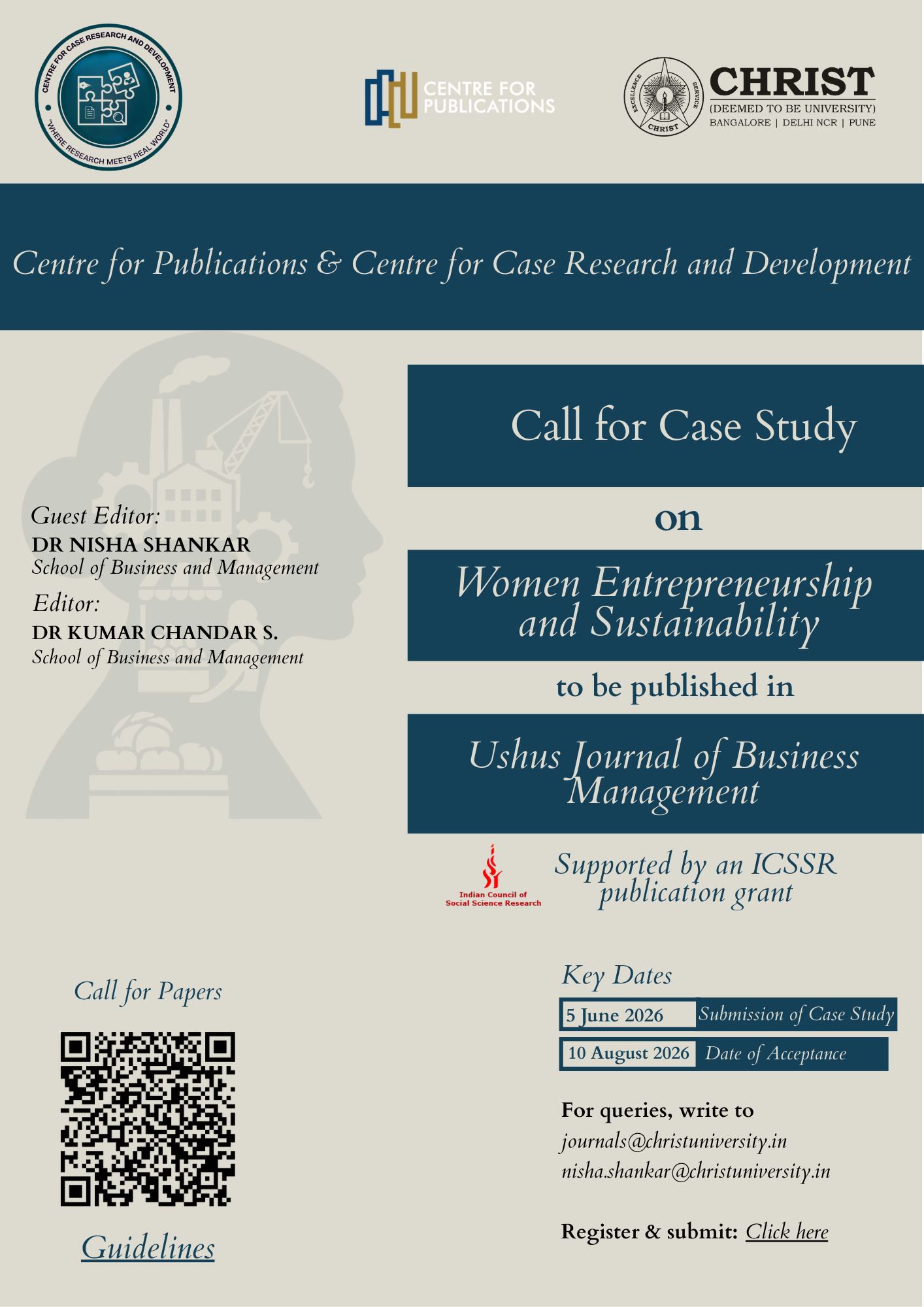Leave No One Behind: AI-Powered Inclusive Development for Viksit Bharat 2047
DOI:
https://doi.org/10.12725/ujbm.68.2Keywords:
Artificial Intelligence, Inclusive Development, Vikasit Bharat 2047, Responsible AI, Marginalised communities, AAI-powered social inclusionAbstract
Vikasit Bharat 2047 envisions a socially and economically developed India. However, achieving this goal requires addressing the challenges faced by underprivileged sections too. This paper explores the potential of Artificial Intelligence (AI) as a transformative tool for inclusive development and examines how AI can empower marginalised communities in areas like education, healthcare, livelihood opportunities etc, particularly in rural areas. The article acknowledges the importance of responsible AI development, ensuring inclusivity and mitigating potential biases, particularly in the Indian heterogeneous society. By harnessing the power of AI responsibly, it is possible to build a more equitable and prosperous India, leaving no one behind on the path to Vikasit Bharat 2047.
References
. Agrawal, R. Role of Artificial Intelligence for Promoting Financial Inclusion. PaKSoM 2022, 12, 159.
. Alam, A. (2023). Harnessing the Power of AI to Create Intelligent Tutoring Systems for Enhanced Classroom Experience and Improved Learning Outcomes. In Intelligent Communication Technologies and Virtual Mobile Networks (pp. 571-591). Singapore: Springer Nature Singapore.
. Asaria, M., Masumdar, S., Chowdhury, S., Masumdar, P., Mukhopadhyay, A., & Gupta, I. (2019). Socioeconomic inequality in life expectancy in India. BMJ Global Health, 4(3), e001445.
. Bajpai, N., & Wadhwa, M. (2021). Artificial Intelligence and Healthcare in India (No. 43). ICT India Working Paper.
. Banerjee, A., Kabadi, S., & Karimov, D. (2023). The Transformative Power of AI: Projected Impacts on the Global Economy by 2030. Review of Artificial Intelligence in Education, 4(00), e020-e020.
. Božić, V. (2023). Artifical intelligence as the reason and the solution of digital divide. Language Education and Technology, 3(2).
. Christophe, J. (2003). India's Silent Revolution: The Rise of the Lower Castes in North India (Reprinted ed ed.). C. Hurst & Co.
. Drèse, J., & Sen, A. (2013). An uncertain glory: India and its contradictions. Princeton University Press.
. EkStep – Re-Imagining Primary Learning Learning Opportunities, https://rohinilekaniphilanthropies.org/ek- step-re-imagining-primary-learning-learning-opportunities/
. Feuerriegel, S., Dolata, M., & Schwabe, G. (2020). Fair AI: Challenges and opportunities. Business & information
systems engineering, 62, 379-384.
. Fitria, T. N. (2021, December). Artificial intelligence (AI) in education: Using AI tools for teaching and learning
process. In Prosiding Seminar Nasional & Call for Paper STIE AAS (pp. 134-147).
. Gruetsemacher, R., & Whittlestone, J. (2019). Defining and unpacking transformative AI. arXiv preprint
arXiv:1912.00747, 1133.
. Hagendorff, T., & Wesel, K. (2020). 15 challenges for AI: or what AI (currently) can’t do. Ai & Society, 35, 355-365.
. Hasmath, R. (Ed.). (2015). Inclusive Growth, development and welfare policy. Abingdon: Routledge.
. Jiang, F., Jiang, Y., Shi, H., Dong, Y., Li, H., Ma, S., ... & Wang, Y. (2017). Artificial intelligence in healthcare: past, present and future. Stroke and vascular neurology, 2(4).
. Jobin, A., Ienca, M., & Vayena, E. (2019). The global landscape of AI ethics guidelines. Nature machine intelligence,
(9), 389-399.
. Jobin, A., Ienca, M., & Vayena, E. (2019). The global landscape of AI ethics guidelines. Nature machine intelligence,
(9), 389-399.
. Kasim, E., & Koshiyama, A. S. (2021). A high-level overview of AI ethics. Patterns, 2(9).
. Kuri, P. K. (2009). Inclusive and exclusive development in India in the post-reform era. In The Politics of Social Exclusion in India (pp. 86-100). Routledge.
. Liu, C., Jiao, D., & Liu, S. (2020). Artificial intelligence (AI)-aided disease prediction. Bio Integration, 1(3), 130-136.
. Manthra (2018). https://mantra4changeblog.wordpress.co
m/wp-content/uploads/2018/03/ekstep_goripalya-report.pdf
. Mhlanga, D. (2023). Artificial Intelligence (AI) Solutions for Financial Inclusion of the Excluded: What Are the
Challenges?. In Economic Inclusion in Post-Independence Africa: An Inclusive Approach to Economic Development (pp. 257-272). Cham: Springer Nature Switserland.
. Mundhe, E. (2024). VIKSIT BHARAT@ 2047: PATHWAYS TO A DEVELOPED INDIA. A PATHWAYS OF VIKSIT
BHARAT@ 2047, 75. [24]. Oseni, A., Moustafa, N., Janicke, H., Liu, P., Tari, S., & Vasilakos, A. (2021). Security and privacy for artificial intelligence: Opportunities and challenges. arXiv preprint arXiv:2102.04661.
. Pandya, V. (2024). From Aspiration to Reality: The Indispensable Role of Academia in Achieving Viksit Bharat
Vidhyayana-An International Multidisciplinary Peer-Reviewed E-Journal-ISSN 2454-8596, 9(si2).
. Patel, S. (2024). Perspective of Digital Transformation in Rural India. International Journal of Science and Research, Vol 13 (4).
. Pfammatter A, Spring B, Saligram N, Davé R, Gowda A, Blais L, Arora M, Ranjani H, Ganda O, Hedeker D, Reddy S,
Ramalingam S (2016), mHealth Intervention to Improve Diabetes Risk Behaviors in India: A Prospective, Parallel
Group Cohort Study. J Med Internet Res 2016;18(8):e207
. Puaschunder, J. M. (2019). Artificial intelligence in the healthcare sector. Scientia Moralitas-International Journal of
Multidisciplinary Research, 4(2), 1-14.
. Sen, A. (2014). Development as freedom (1999). The globalisation and development reader: Perspectives on development and global change, 525.
. Tigard, D. W. (2021). Responsible AI and moral responsibility: a common appreciation. AI and Ethics, 1(2), 113-117.
. World Bank (2022), World Development Indicators.
. Yasir, A., Ahmad, A., Abbas, S., Inairat, M., Al-Kassem, A. H., & Rasool, A. (2022). How Artificial Intelligence Is
Promoting Financial Inclusion? A Study On Barriers Of Financial Inclusion. In 2022 International Conference on
Business Analytics for Technology and Security (ICBATS) (pp. 1-6). IEEE.
. Sia, M. H., & Ahmed, H. (2022). Ethical AI for Social Good: Balancing Progress and Responsibility. Unique Endeavor in Business & Social Sciences, 1(2), 6-11.
Downloads
Published
How to Cite
Issue
Section
License
Copyright (c) 2024 Anilkumar U P

This work is licensed under a Creative Commons Attribution-NonCommercial-NoDerivatives 4.0 International License.



